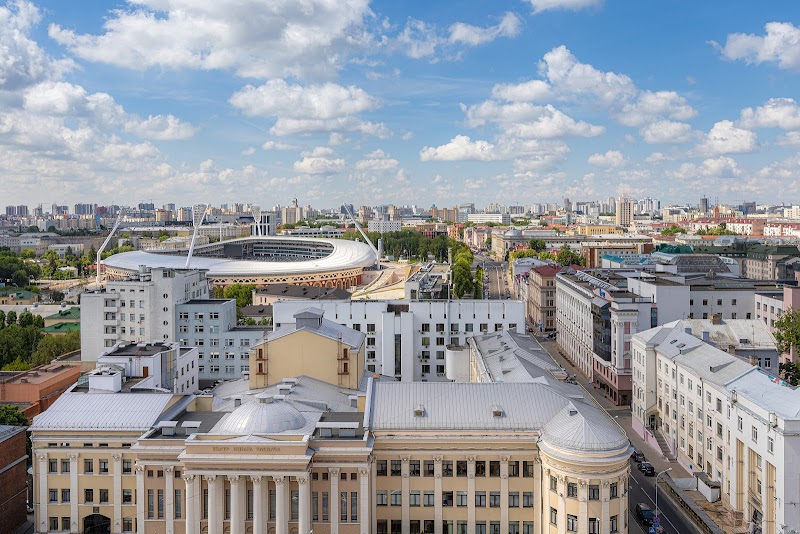Stanislau Shushkevich (15 December 1934 – 3 May 2022) was a Belarusian politician and scientist who served as the first president of Belarus from 1991 to 1994.
Born into an intelligentsia family in Minsk, Belarus, Shushkevich graduated from the Belarusian State University in 1956 with a degree in physics. He then worked as a scientist at the Institute of Physics of the National Academy of Sciences of Belarus. In 1970, he became a professor and head of the department of nuclear physics at the Belarusian State University.
Shushkevich entered politics in 1989, when he was elected to the Supreme Soviet of the Byelorussian Soviet Socialist Republic. He became a vocal critic of the Soviet government and a supporter of Belarusian independence.
In 1991, Shushkevich was elected chairman of the Supreme Soviet of Belarus, the country’s highest legislative body. On 25 August 1991, he declared Belarus’ independence from the Soviet Union.
Shushkevich served as the first president of Belarus from 1991 to 1994. During his presidency, he oversaw the transition from a Soviet republic to an independent country. He also initiated a number of reforms, including economic liberalization and the introduction of a new constitution.
Shushkevich’s presidency was marked by political instability and economic difficulties. He was accused of corruption and incompetence by his opponents. In 1994, he lost the presidential election to Alexander Lukashenko.
After his presidency, Shushkevich continued to be active in politics and academia. He served as a member of the Belarusian parliament from 1995 to 2000 and from 2004 to 2008. He also taught at the Belarusian State University and the European Humanities University in Vilnius, Lithuania.
Shushkevich died on 3 May 2022 at the age of 87.
- Achievements:
- Declared Belarus’ independence from the Soviet Union in 1991.
- Oversaw the transition from a Soviet republic to an independent country.
- Initiated a number of reforms, including economic liberalization and the introduction of a new constitution.
- Legacy:
- Widely regarded as the father of Belarusian independence.
- His reforms laid the foundation for the country’s economic and political development.
- Remembered for his commitment to democracy and human rights.
- Something popular about him:
- Known for his sense of humor and his love of literature.
- Was an avid chess player.
- Spoke several languages, including English, French, and German.
Emblem of Belarus
To enrich your insights into presidential figures worldwide, also explore some prominent first presidents from other countries, such as Barbados, Bangladesh and Bahrain. Delving into the leadership journeys of these figures can offer valuable perspectives on their historical significance and pivotal roles in shaping global politics.
The official residence and symbol of the Belarus President
10 Iconic Presidents Who Shaped Belarus’s History

Belarus has had three presidents since gaining independence from the Soviet Union in 1991. Let’s take a look at the 10 most popular presidents from Belarus:
- Alyaksandr Lukashenko
- Vyacheslav Kebich
- Alyaksandr Kazulin
- Alyaksandr Milinkevich
- Stanislau Shushkevich
- Henadz Karpenka
- Henadz Svyatlou
- Alyaksandr Radzkou
- Syargei Kalyakin
- Syargei Leonau
Alyaksandr Lukashenko, the first and only president of Belarus since 1994, is undoubtedly the most popular president in the country’s history. He has been in power for over 25 years and has maintained a strong grip on the government. Despite controversies surrounding his leadership, Lukashenko has managed to maintain a loyal support base.
Vyacheslav Kebich served as the Prime Minister of Belarus from 1990 to 1994 and briefly assumed the presidency in 1994. His presidency was marked by economic reforms and efforts to strengthen ties with other countries.
Alyaksandr Kazulin, a former rector of the Belarusian State University, ran for president in 2006 and gained popularity among opposition supporters. He was imprisoned for his political activities, which further increased his popularity.
Alyaksandr Milinkevich, the leader of the opposition movement during the 2006 presidential election, also gained significant popularity. He was seen as a symbol of resistance against Lukashenko’s regime.
Stanislau Shushkevich, the first leader of independent Belarus in the early 1990s, played a crucial role in the country’s transition from Soviet rule to independence. He is respected for his contributions to the establishment of Belarus as an independent state.
Henadz Karpenka, an opposition politician, has been actively involved in advocating for democratic reforms and human rights in Belarus. He has gained support among the younger generation in particular.
Henadz Svyatlou, although not a well-known figure nationwide, has built a significant following due to his activism in the field of culture and art. He is popular among intellectuals and artists.
Alyaksandr Radzkou, a former Deputy Prime Minister, has gained popularity for his work in the economic sphere. He is seen as a competent and pragmatic leader.
Syargei Kalyakin, the leader of the Communist Party of Belarus, is known for his communist ideology and his efforts to protect workers’ rights. He has a dedicated following among trade unions and workers.
Syargei Leonau, a well-known journalist and political commentator, has gained popularity for his critical analysis of the government and his support for democratic reforms. He is respected for his independent and objective stance.

